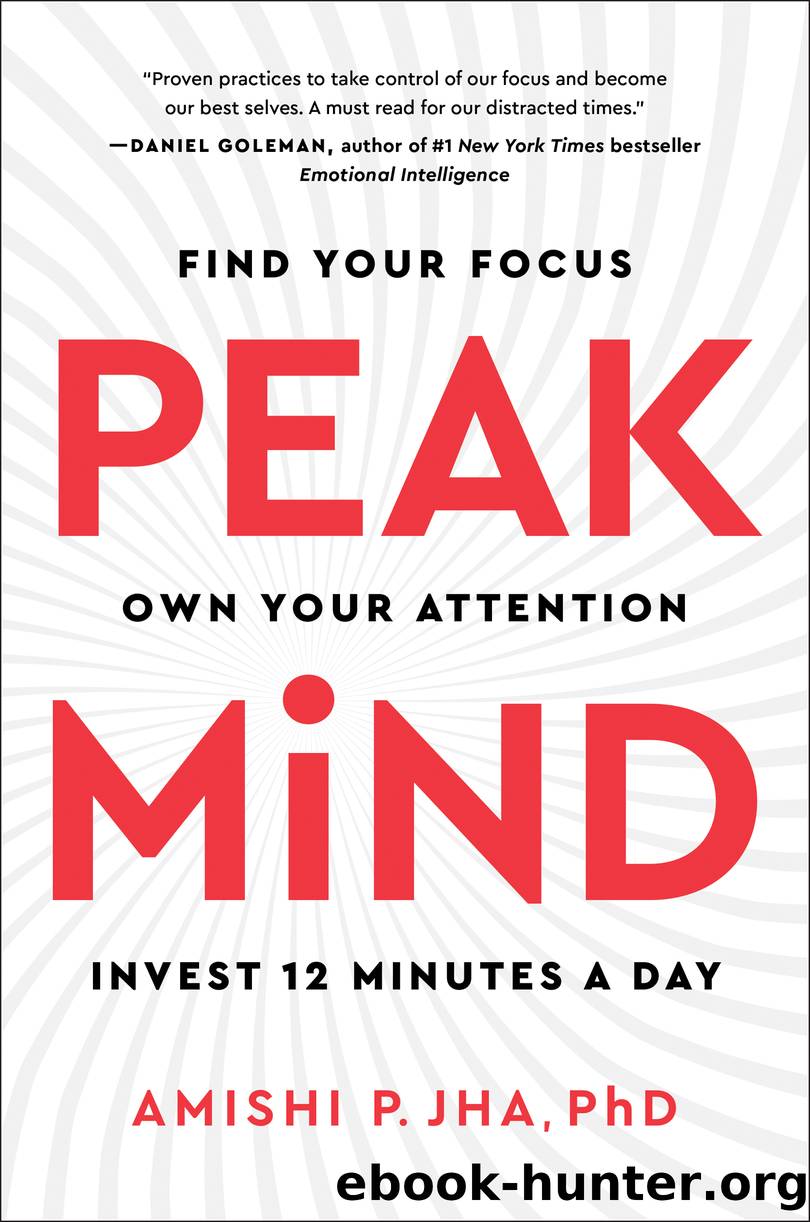Peak Mind by Amishi P. Jha

Author:Amishi P. Jha
Language: eng
Format: epub
Publisher: HarperOne
Published: 2021-08-25T00:00:00+00:00
The Power of a Story
One of the motivating reasons I wanted to work with military service members was exactly that: I wanted to know if we could help them not only to pay attention better, but also to be more discerning and situationally aware. Situational awarenessâthe mental state of constantly knowing whatâs going on around youâis critical for people in a variety of professions, including police and first responders. Could mindfulness training, I wondered, help soldiers (or anyone) come into situations less susceptible to biased thinking so they could see more clearly, be less reactive, and respond appropriately and proportionately?
Our prediction was yes, because of how mindfulness practice guides you to use your attention: in the present moment, without judgment, elaboration, or reactivity. In other words: without making up a story about what youâre experiencing.
Sometimes a story is given to us and we quickly accept itâlike the soldiers and the expected insurgent camp. Other times we arrive at the story ourselves, through our own mental simulation. We are incessantly concocting narratives about what might happen in an hour, or tomorrow, or about what others are thinking or feeling, or about their motivations. We visualize options and courses of action. We imagine how events might play out so that we can be more prepared; we troubleshoot various possibilities: If she says x, should I reply y or z? If that road is closed, what detour will I take? If the schools reopen while COVID cases are still high and new variants are emerging, will we send our kids? To visualize the possible answers to such questions, you create a whole world in your mind, with sensory details, characters, plot lines, and sometimes even dialogue. You experience emotions in response to this world youâve createdâit makes you feel sad, or anxious, or satisfiedâand those feelings help you make decisions about what you may choose to do next.
We use simulations to arrive at mental models that guide our thinking, decision making, and actions. This is really what I mean when I say âstory.â You come up with these mental models, or âstories,â rapidly and constantlyâyou simulate, arrive at one, then use it and move on; or you receive new information that causes you to update or dump that story and simulate a different one. The key ingredients for your simulations? Memories of episodes you have experienced in your life, fragments of these memories, plus everything else you have learned and remember. Add to the mix your capacity to think, reason, and forecast, and voilà âa freshly simulated new story!
The simulation process is vivid, detail-rich, and captivating, and the mental model requires our attention and working memory to come alive. But it also puts heavy demands on these limited capacity systems. Thatâs part of the reason stories are so powerful: they can become a kind of âshorthandâ for efficiently framing and maintaining a situation, problem, or plan in mindâand this efficiency helps free up cognitive resources to do other things. But (thereâs always a but) stories also constrain information processing.
Download
This site does not store any files on its server. We only index and link to content provided by other sites. Please contact the content providers to delete copyright contents if any and email us, we'll remove relevant links or contents immediately.
Four Thousand Weeks by Oliver Burkeman(1836)
What Happened to You? by Oprah Winfrey(1760)
Karma by Sadhguru(1600)
This Changes Everything by Unknown(1499)
You Are a Badass: How to Stop Doubting Your Greatness and Start Living an Awesome Life by Jen Sincero(1169)
Don't Sweat the Small Stuff...and It's All Small Stuff by Richard Carlson(1111)
Infinite Circle by Bernie Glassman(1046)
How to Do the Work by Dr. Nicole LePera(1000)
Let's Talk About Hard Things by Anna Sale(980)
Declutter Your Mind: A step by step guide to learn to control your thoughts, stop worrying, relieve anxiety and eliminate panic attacks and negative thinking by Mia Chandler(952)
Who Moved My Cheese? by Spencer Johnson(946)
The 4-Hour Workweek by Timothy Ferris(945)
Real Strength: Build Your Resilience and Bounce Back From Anything by Psychologies Magazine(934)
The Path of Greatness--The Game of Life and How to Play It and Other Essential Works by Florence Scovel Shinn(915)
Breakup Bootcamp by Amy Chan(891)
Be Your Best Self by Mike Bayer(884)
Curative Magic by Rachel Patterson(873)
The Book of Hope by Jane Goodall(859)
Advice for Working Moms (HBR Working Parents Series) by unknow(858)
